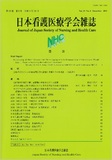Japanese
English
- 有料閲覧
- Abstract 文献概要
- 参考文献 Reference
要旨
在宅で生活する認知症高齢者の家族介護者が認知症診断時と診断後に抱いた心情を明らかにするため、家族サロンまたは認知症カフェに参加している家族介護者6名に半構造化インタビューを実施した。その後、逐語から家族介護者の心情をコードとして抽出し、認知症の診断時と診断後に分類し、それらを類似性によりカテゴリ化した。なお、診断後の心情は、コードを肯定的・否定的な心情に分類をした後にカテゴリ化を実施した。結果、認知症診断時、家族介護者は混乱や葛藤をした後、認知症の診断を受容していた。そして、将来への不安を抱きながらも、介護する上での希望を発見していた。認知症診断後、家族介護者は肯定的な心情として、認知症高齢者が快活である幸せ、認知症高齢者を受容、介護者役割を獲得、自分の安息を切望、認知症高齢者との共生を希望、介護を継続する意欲、周囲の支援の大切さを抱いていた。一方、否定的な心情として、認知症高齢者と意思疎通をする困難さ、日常生活での心労、言動への憤り、狼狽、拘束感、孤立感、介護継続への危機感を抱いていた。
We aimed to explore the complexity of emotions experienced by family caregivers at the initial dementia diagnosis and post-diagnosis. We conducted semi-structured interviews with six family caregivers who frequented a family salon or a dementia café in the chosen city and analysed the collected transcripts and coded them. Furthermore, we classified these codes into two periods: at the initial dementia diagnosis and post-diagnosis. We also classified the codes of the latter into two types: positive and negative. Thereafter, we categorised the emergent themes based on their similarities to determine a concise narrative of the participating family caregivers experienced emotions.
When dementia was first diagnosed, family caregivers reportedly found themselves in a state of confusion and conflict, before eventually accepting it. Subsequently, caregivers struggled with both hope and anxiety. Post-diagnosis, family caregivers often experienced positive emotions, including happiness in cheering their relatives up, acceptance of symptoms, acquisition of the caregiver roles, a desire for respite, a sense of hope around living with their older relative, a willingness to continue caring for them, and realising the importance of having support from others. However, family caregivers also experienced several negative emotions, including difficulties in communication, feeling a sense of worry in their daily lives, anger toward the symptoms of dementia, confusion, restraint, isolation, and an ongoing sense of crisis.
Copyright © 2021, Japan Society of Nursing and Health Care All rights reserved.


